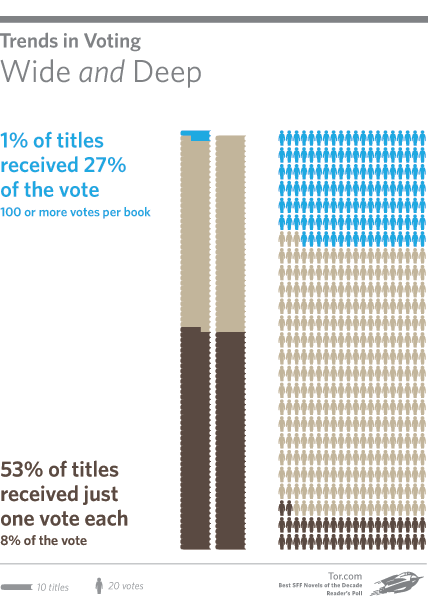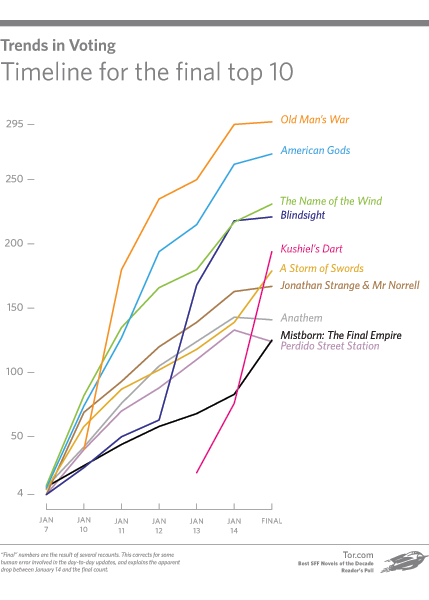If there’s one thing that the average trends in the Best SFF Novels of the Decade data showed, it was that the average book of the decade was published in 2009, and was nominated for, but did not win, a Hugo Award. Also that it was a parallel-world fantasy of epic proportions (or at least deadly), the first book in an unfinished series of undetermined length (possibly a trilogy, but perhaps not), and was written by a male author (with a middle initial of J. or maybe M.), and with at least one other book on the list.
It was also called something like The Shadow War of the Night Dragon, Book One: The Dead City. But we’re getting ahead of ourselves.
A later data-set will go more in focus on the above averages, but before we can do that, we’ll need to lay some foundation with this executive summary of data from the Reader’s Poll:
- Total number of books with at least one vote: 1692
- Total number of votes: 10,333
- Number of years in a Tor.com decade: 11
- Number of books earning at least one vote that were not published in this “decade”: 87
- Most votes for a book not published in this decade: 25
- Minimum number of books that were fanfiction: 1
- Portion of eligible books that received only one vote: 52.57%
- Portion of all elibigle book votes: 8.44%

Download a PDF of the above chart here.
- Portion of eligible books receiving more than 100 votes each: 1.05% (17 books)
- Portion of all votes going toward those 17 books: 27.41%
- Portion of eligible books receiving more than 10 votes each: 12% (195 books)
- Portion of all votes going toward those 12 percent of books: 70.63%
- Number of eligible books with more than 50 votes: 36
- Most books on the list by a single author: 25 (L.E. Modessit Jr.)
- Most books on the list by a single author with more than 10 average votes per book: 19 (Jim Butcher, average vote per book 14.8). Terry Pratchett comes in with fewer books (13), but more votes per book (average 29).
- Most impressive book:vote ratio: 1:231 (Patrick Rothfuss)

Download a PDF of the above chart here.
Above is a timeline of the status of the top ten voted titles as they progressed through the week of voting. Some books show a steady progression while others undergo large spikes as fans of that book or author found out about the poll.
Numbers in the “Final” numbers are the result of several recounts. This corrects for some human error involved in the day-to-day updates, and explains the apparent drop (and sudden gain) in some titles between January 14th and the final count.
There’s more data to come! Tomorrow we’ll be looking at how the genres stack up against each other in popularity, how the years compare with each other, along with how this poll parallels with the major SFF awards.









